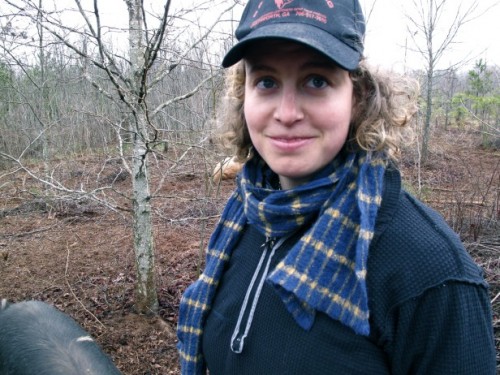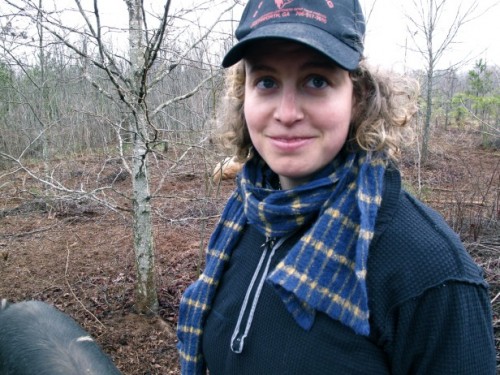 Severine von Tscharner Fleming, farmer and director of the film The Greenhorns.
Severine von Tscharner Fleming, farmer and director of the film The Greenhorns.
Severine von Tscharner Fleming is the director of the forthcoming film The Greenhorns and founder of the crucial new young farmer organization of the same name. Here’s her no-nonsense, take-no-prisoners perspective on the young farmers movement. Make no mistake, this woman is dedicated and smart — and she’s recruiting.
Q. What is Greenhorns all about?
A. It’s about the community of young farmers in this country. We are a nonprofit organization that works to promote, recruit, and support young farmers. Mostly what we do is produce media — print resources, new media, and programming for young farmers. Recently, there has also been an emphasis on events.
Q. Did it come about before or after the film?
A. The whole thing started with the film, with the idea that we’d better document this glorious and burgeoning movement, and share the excitement with more young people who might be inclined to enter agriculture professionally. But soon we realized that making a movie takes a long time, and that we’d better start communicating in other ways as well. So we started a wiki for relevant resources, a blog for news and video ephemera, then we got a weekly radio show and podcast on Heritage Radio Network, we began to tweet, etc.
Q. What are you growing, and where? What got you going in ag?
A. Last season, my friends Michelle, Anya, and I, with help from my little brother Charlie, ran our own farm, smithereen farm, in the Hudson Valley of New York. We planted an orchard, raised pigs, rabbits, laying hens, a few fowl, and about three-quarters of an acre of vegetables, flowers, and herbs. We sold to three fancy restaurants, an organic grocery store, and a farmers market. We also dried 2,000 marjoram plants and sold them to Formaggio Kitchen, a fancy food store in Cambridge, Mass.
Farming is pretty much the love of my life. Back in college I was part of a posse starting the Pomona College Organic Farm, a very guerilla project, a permaculture fruit orchard with permanent raised beds. We had such a wonderful time building that farm, hustling hoses, hauling mulch, hosting work/harvest parties — but we had quite a trouble convincing the college of its merit. Goes to show the changing climate for agriculture within the groves of academe, because the farm is now on the college’s admission tour!
This coming season I’ll be working on my friend Dina Brewster’s farm The Hickories in Connecticut. It’s a 200-family member organic CSA with fruit, vegetables, and meat. Dina is a bad-ass young farmer, ex-poetry teacher, and sage greenhorn.
Q. I did several farm apprenticeships in the 1990s, but was unable to figure out how to get some land of my own that I could afford. Is access to land still an issue?
A. Access to land is a major issue! In our guidebook, we have a list of 20 different pathways to tenure and some institutions that deal with the legal details. There is also a report put out by Farmlasts with relevant insight.
Q. Advice?
A. First step: manufacture some magic! You’ll soon figure out the particular troubles accessing land in the community you want to farm — but basically it’s a lot easier to find land in smaller towns away from major cities. It’s of course a lot easier if you have cousins or uncles who own some land, and it’s also a lot easier if you are friendly, responsible, hardworking, and lucky!
Here in the Hudson Valley of New York where I live, many young farmers face “land drama.” As a result, Greenhorns is partnering with our local County Extension to host a meeting and produce a series of papers about expectations and “best practices” in leasing between non-farming landowners and beginning farmers. In this valley and in many other metro-foodsheds, we’ve got to figure out how to navigate the relationship between real-estate value and farm business viability.
Q. Are the new young farmers you know thinking about the macro or micro? Do they want to feed the country, feed themselves, or is it both?
A. Think globally, farm locally. Dominated as our food system has become by the mega-consolidation of poultry, beef, dairy, and hogs, the government has got to crack the monopoly. Our role is to replace that monopoly with a mosaic of small and medium-sized farms and food businesses. That means more new processing plants, cheese makers, butchers, bakers, candlestick makers, more locally owned grocery stores, more entrepreneurship at all levels, and more protagonism within those businesses.
It took Monsanto 20 years to consolidate their hold on our seed supply, and it’ll probably take us 20 years to shake that monkey, but that is only half a professional lifetime for my generation.
Q. Any highlights from the recent Drake Forum on Beginning Farmers in D.C. to share?
A. Thanks to Matt Russell and Drake University Law Center for providing such a resonant national venue for a conversation about beginning farmer issues. I presented about the National Young Farmers’ Coalition and Greenhorns, and on Saturday night got to screen a sneak peek of our film.
As proud as I was to raise my voice on the same stage as Agriculture Secretary [Tom] Vilsack and Sen. [Tom] Harkin, I was prouder still of the strong community of young farmers, activists, and organizers that swirled the lobbies and corridors. The beginning farmer posse, the folks of my generation who have staked their lives on rebuilding our food system, seeing all of their twinkling eyes all together was my highlight.
Secretary Vilsack said, “It’s not just that what we’ve been doing the last few years to support farmers and rural communities hasn’t been working. It’s that what we’ve been doing for the last few decades hasn’t been working.” He also said that 45 percent of the armed services are folks coming from rural America. Translated: Our agricultural system has become broken to the point where the opportunity to serve in uniform is more promising than the opportunity to serve your country food. My question for Vilsack: If people born in rural areas can’t afford an education without joining the Army, how about the USDA providing educational debt forgiveness for farmers?
Q. You’re a charter member of the newly forming Young Farmers’ Coalition. What excites you about it?
A. Well, our first order of business was getting the legal framework set up. Our website is up and now we are recruiting young farmer leadership from all the states in the union to represent. I’m especially excited at the idea of getting a sponsor so we can hold a national congress with loud music.
Q. When I took a beginning farm business course in the late 90s, it was the first time I’d ever heard of such a thing. Now farm training programs are all over the place, and the USDA is stepping in with $17 million in grants to 29 such programs as part of its Beginning Farmer and Rancher Development Program (BFRDP). So it seems like a great time to get into in ag! Have you plugged into these sorts of opportunities or programs?
A. Yes indeed. And Greenhorns is actually getting money from the BFRDP! Amazing that punky grassroots ninjas like us would qualify. But we do, because we provide services, communication, marketing, and training resources to beginning farmers and have become a snappy little node in the beginning farmer world. Here in the Northeast, our partnership with Cornell Small Farm Extension, Farmlink, Farmnet, Farm Viability, Heifer International, NOFA NY, Future Farmers of America, and a few others is designed to enhance regional training opportunities.
Q. What plans do you have for enhancing educational opportunities to help new farmers get going?
A. Our main task is to help with networking and producing a series of posters for classrooms about farming, generating web content for even younger aspiring farmers, bringing young farmers into classrooms, screening the film, brainstorming with partners about how to organize/map beginning farmer service providers using a GIS framework, partner with relevant educational groups like Farm-Based Education Association and Grace Foundation to produce materials for K-12 teachers, and just generally make a cultural ruckus about young farmer rockstars around the country.
Q. The map at the Greenhorns site is a nice way to see where new farms/farmers are popping up.
A. Our plan for the map is quite ambitious, but we’re still fundraising for it so I don’t want to spill the beans yet. Any ninja web designers with ideas, please be in touch, farmer@thegreenhorns.net.
Are you a young farmer? Join the map!
Q. What’s the connection between farming and empowerment?
A. Jefferson knew. Washington knew. The new agrarian movement knows.
Farmers make sugar from sunshine. Farmers work at the interface of the wildness in our landscape. Farmers are the foundation of our economy. Farmers are fiercely independent, self-reliant, and accountable to their relationship with place. Farmers are good at identifying bullshit.
Q.Young farmers face big challenges as they plug into the food system, but what kinds of advantages do they have?
A. We have the advantage of youth. Brave muscles, a fierce passion, and probably pretty savvy marketing insights. We have the advantage of eager eaters, dilapidated (but standing!) barns, plus sophisticated e-networks to access seeds, nursery stock, rare livestock breeds, training opportunities, season extension technologies, etc. We also have the advantage of dozens of institutions founded by our elders like organic certification bodies, regional sustainable-ag groups and networks, and land trusts. We have a generation of wise, thoughtful, and experienced mentors willing to teach us.
We have a country that needs us to step to the plate, swing that pick, and plant the future — now!
The Greenhorns site is where the young farming movement can be found, and its podcast is a great way to hear how new young farmers are making their way in the world. It’s just one of many solid farm and slow-food podcasts available from the Heritage Radio Network.


